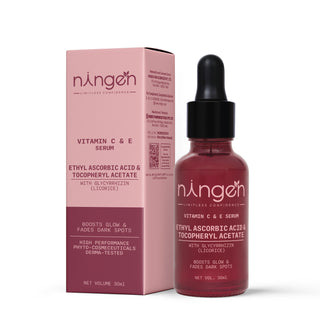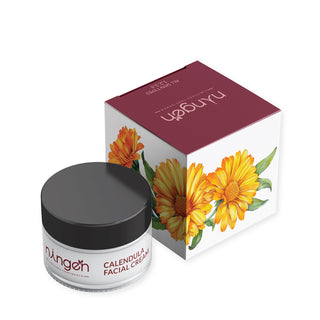So let's understand ways to identify your skin tone accurately. This knowledge will help you choose the right kind of skincare products, make up and of course your perfect skincare routine.
We reflect a diverse range of shades and tones due to concentrations of melanin in your skin. If you have dark skin it will be slightly drier especially as we age. This is because darker skin is slightly higher transepidermal water loss which means dark skin is often drier. This could be due to lower ceramide level in the top layer of the epidermis. Notably, Ceramides are fats naturally found in the top layers of the skin between cells, which improves the function of the skin barrier by holding water in the skin.
In this case you can include these ingredients in your skincare routine;
- Ceramides
- Amino acids(peptides)
- Humectants
How to determine your skin tone?
I. Natural Light Assessment
One of the simplest and most effective methods to determine your skin tone is through a natural light assessment. All you need to do is to follow these steps;
Cleanse and Prepare:
Start with a freshly washed face, devoid of any makeup or skincare products.
Find Natural Light:
Position yourself near a window or step outside into natural daylight. Avoid direct sunlight as it may alter your skin's appearance.
Observe Your Veins:
Look at the veins on your wrist or inner arm. Note their color. This will help determine your undertone, a crucial aspect of skin tone identification.
- Cool Undertones: If your veins appear bluish or purple, you likely have cool undertones. Your skin may have pink, red, or bluish hues.
- Warm Undertones: If your veins appear greenish or olive, you likely have warm undertones. Your skin may have yellow, peach, or golden hues.
- Neutral Undertones: If your veins appear bluish-green, you likely have neutral undertones. Your skin may have a balanced mix of warm and cool hues.
Compare Against Standard Charts:
Utilize standard skin tone charts or swatches that showcase various shades. Hold them against your face and observe which ones harmonize best with your natural complexion.
II. Jewelry and Clothing Analysis:
Another helpful approach to identifying your skin tone is to consider how different metal and fabric colors interact with your complexion.
Silver vs. Gold:
Try on silver and gold jewelry separately and observe their effects on your skin.
- Silver Preference: If silver jewelry complements your skin tone, you likely have cool undertones.
- Gold Preference: If gold jewelry enhances your complexion, you likely have warm undertones.
- Both or Neither: If both silver and gold jewelry look flattering, or if you notice no significant difference, you may have neutral undertones.
Clothing Colors:
Experiment with different fabric colors against your skin to determine which hues bring out your natural radiance.
- Cool Undertones: If you find that blues, purples, and pinks accentuate your features, you likely have cool undertones.
- Warm Undertones: If earthy tones like yellows, oranges, and browns enhance your complexion, you likely have warm undertones.
- Neutral Undertones: If you notice that a wide range of colors suit your skin tone, you likely have neutral undertones.
III. Professional Consultation
When in doubt or if you find it challenging to discern your skin tone, seeking advice from a professional can provide valuable insights and guidance:
Dermatologist or Esthetician: Schedule an appointment with a dermatologist or esthetician who specializes in skincare. They can analyze your skin and provide personalized recommendations based on your undertones and other factors.
Beauty Counter Experts: Visit beauty counters at reputable stores where trained makeup artists can assist you in determining your skin tone. They often have a variety of foundation shades to help identify the most suitable match.
IV. Embracing Your Unique Skin Tone
Regardless of the outcome of your skin tone analysis, it is essential to embrace and celebrate your unique complexion. Remember that beauty comes in all shades and tones. Here are some key points to keep in mind:
Confidence and Self-Acceptance: Embrace your skin tone as a beautiful reflection of your heritage, identity, and individuality. Develop self-confidence by recognizing the uniqueness you bring to the world.
Skincare and Makeup Choices: Once you have determined your skin tone, explore skincare and makeup products specifically designed to enhance and complement your complexion. Consider shades that will bring out your best features and allow your natural beauty to shine through.
Fashion and Style: Use your newfound knowledge of your skin tone to make fashion choices that enhance your overall appearance. Experiment with different clothing colors and accessories to find what makes you feel confident and stylish.
Science behind your Skin Tones
- The science behind skin tone involves a combination of genetic, cellular, and biochemical factors. The primary determinant of skin color is the pigment called melanin, which is produced by specialized cells called melanocytes present in the epidermis, the outermost layer of the skin.
- Melanin comes in two main types: eumelanin, which is brown to black, and pheomelanin, which is yellow to red. The relative amounts and distribution of these pigments within the skin determine the variations in skin tone and color.
- The production of melanin is regulated by several genes, including the melanocortin 1 receptor (MC1R) gene. Variations in these genes can affect the type and amount of melanin produced, resulting in different skin tones. For example, individuals with higher levels of eumelanin have darker skin tones, while those with lower levels or higher levels of pheomelanin have lighter skin tones.
- Ultraviolet (UV) radiation from the sun also plays a role in determining skin tone. When the skin is exposed to sunlight, it triggers the production of melanin as a protective response. This is why people tend to have darker skin in regions closer to the equator, where there is more intense sunlight.
- Factors such as the size and distribution of melanosomes (structures that store melanin), the activity of enzymes involved in melanin synthesis, and the overall thickness and vascularity of the skin can influence skin tone.
Classification of Skin Tones:
Fitzpatrick Scale
The Fitzpatrick Scale, developed in 1975 by Thomas B. Fitzpatrick, is a widely used classification system for categorizing skin tones into six broad categories based on the skin's reaction to sun exposure.
Von Luschan's Chromatic Scale
Another scale used in anthropology is Von Luschan's Chromatic Scale, which uses a set of 36 color tiles to determine skin tones.
The Role of Melanin
Darker Skin Tones:
People with darker skin tones possess higher levels of melanin, which provides protection against harmful UV radiation. It also contributes to a decreased risk of skin cancer.
Lighter Skin Tones:
Lighter skin tones have less melanin, making them more susceptible to sunburn and increased vulnerability to skin damage caused by UV rays.
Cultural Significance of Skin Tones
Historical and Cultural Influences
Symbolism:
Throughout history, certain cultures have associated specific skin tones with social status, beauty standards, and cultural identity. These associations have led to both positive and negative connotations.
Colonial Legacy:
The colonial era has left a lasting impact on the perception of skin tones, particularly in regions where colorism and discrimination based on complexion are prevalent. The influence of Eurocentric beauty standards is still evident today.
Representation and Empowerment
Breaking Stereotypes
In recent years, there has been a push for more diverse representation in media and fashion industries, challenging traditional beauty standards and celebrating a wide range of skin tones. This inclusivity helps foster self-acceptance and empowers individuals to embrace their unique beauty.
To wrap up, you must understand your skin tone so that you can easily optimize your beauty routines, fashion choices, and overall self-expression. Through natural light assessment, jewelry and clothing analysis, and professional consultation, you can confidently identify your unique complexion. Remember, the true beauty lies not in conforming to specific standards but in embracing the diversity that exists within all skin tones. Celebrate your individuality and let your radiant skin tone be a source of pride and self-assurance. Try Ningen SkinSens AI for best beauty advice.









